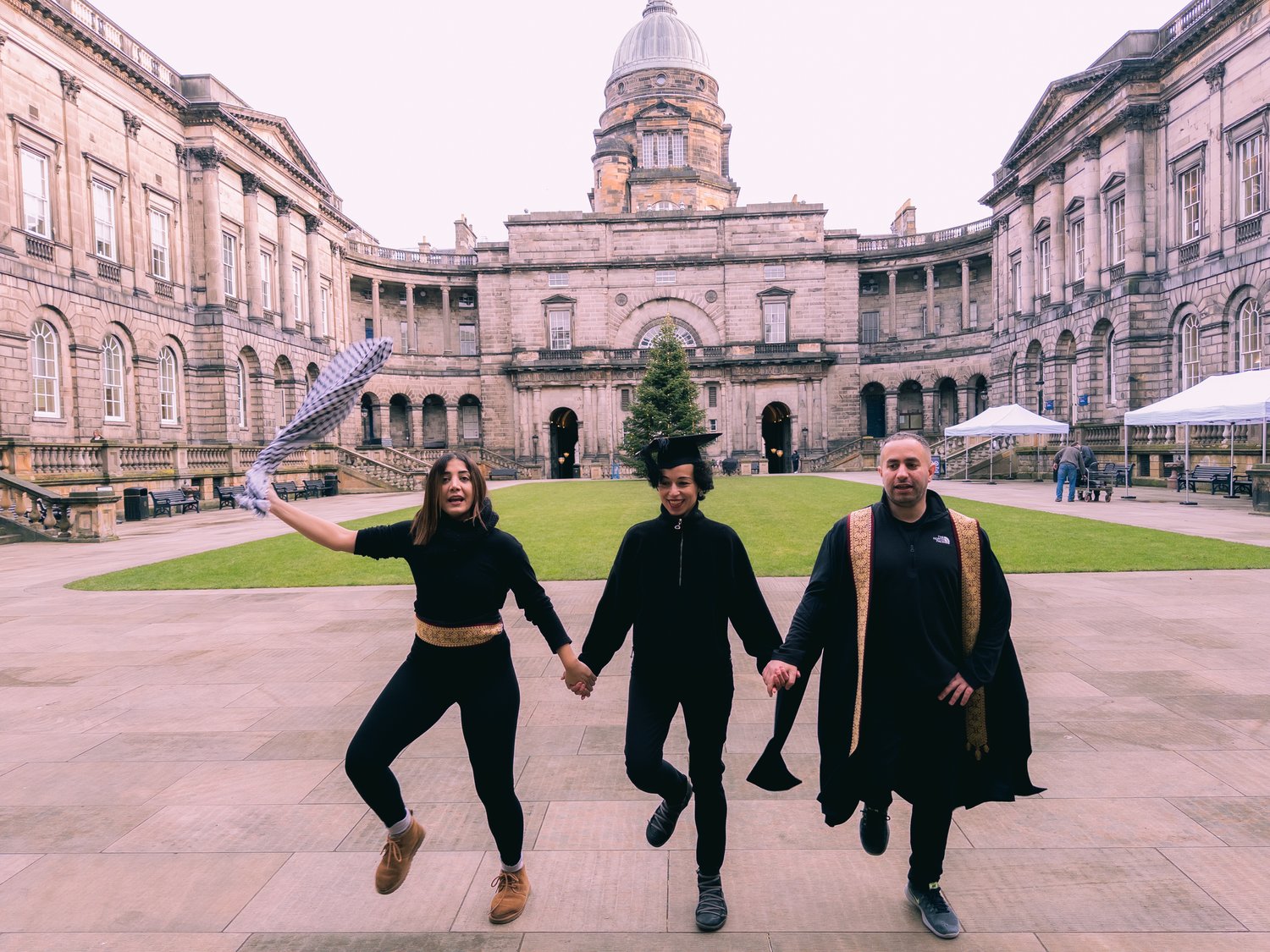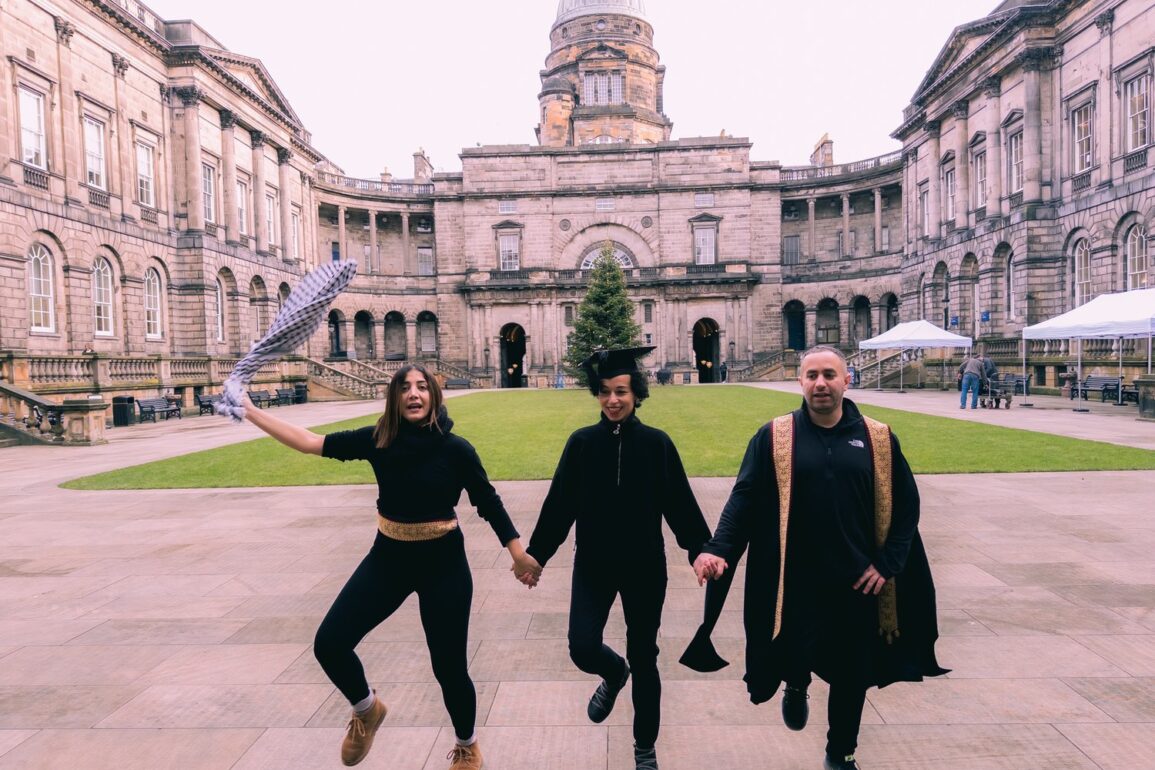
By Samar Jamal | Photo by Lucas Chih Peng Kao
What would you do if you were handed a letter of apology from the UK government for the Balfour Declaration, complete with a promise of reparations to Palestine?
In Farah Saleh’s powerful performance lecture, Balfour Reparations 2024-2044, this provocative scenario becomes reality. Set in 2044, twenty years after a fictional apology is issued, the audience is transported into a world where they are no longer passive spectators – they are an evaluation committee tasked with assessing the UK’s seven reparative commitments.
Through a mix of movement, spoken word, and participatory action, Saleh challenges us to confront the weight of the UK’s colonial past and our role in shaping a decolonial future.
“I usually work in a participatory way because I don’t believe in passive spectatorship,” Farah explains over Zoom. “For me, decolonial practice should involve people through bodily experiences and sensations rather than only relying on so-called intellect. It’s about being active and feeling and experiencing and going back to the body and being embodied. It’s a somatic approach where we can work with the body and intellect together.”
I went along to the performance when it was held at Queen’s Park Baptist Church. The seating arrangement – a semi-circle with Farah at its apex – fostered a shared sense of focus and visibility among participants. A random member of the audience began by reading the first paragraph of the apology aloud, passing the microphone to the next participant to continue. As the words filled the space, Farah danced at the center, her movements embodying and amplifying the text.
Adorned in a university robe, custom designed with tatreez (the traditional Palestinian embroidery technique). The outfit is an ode to the PHD student’s refusal to attend her graduation ceremony in protest of The University of Edinburgh’s investments in companies linked with arms sales to Israel.
The first reparation is an acknowledgement of James Arthur Balfour’s colonial legacy and his belief that “men are not born equal.” The Scotsman’s words are a piercing reminder of Scotland’s colonial history, often overlooked.
The second reparation outlines the UK’s commitment to cease arming Israel. The third calls for UK universities to divest from companies supporting the illegal military occupation and colonisation of Palestine. The fourth advocates for removing free speech restrictions on Israel and Palestine discussions, while the fifth pledges to incorporate the history of the UK’s colonisation of Palestine into school and university curricula. The sixth promises resources to rebuild universities in Gaza and provide scholarships in the UK. Finally, the seventh reparation commits the UK to endorsing a one-state solution, allowing for the creation of a new single state in Palestine/Israel and granting the right of return to all Palestinian refugees.
Once these commitments were outlined, the room darkened, and visual representations of the reparations were projected onto a screen. The evaluation committee then repeated the recitation of the reparations, this time stepping to the front of the room. By standing visibly in the center of the audience whilst Saleh danced around us, each reader embodied a sense of accountability.
For Saleh, these actions are a critique of modernity and Eurocentric thought and its desire to prioritise intellect, productivity and individualism at the expense of emotional expression and collective experiences.
A profound silence enveloped the space as one committee member finished reading and paused, waiting for someone to take the microphone. That silence was charged, drawing out feelings of shame. It compelled the audience to sit with the uncomfortable reality of complicity and a pressing desire to take responsibility.
At the end, the committee built on the reparations, which are a reflection of activists’ demands and letters from students to universities, including Saleh’s own – the University of Edinburgh. The initial fictive apology was written as if it was from this uni, the same institution that Balfour held the title of Chancellor, which went viral as readers thought it was real. It pushed the university to include Palestine in its race review but Saleh wanted to make the apology national.
Finally, the committee’s reflections were played over in a cascading loop, creating a sense of togetherness. This mirrored the Balfour Reparations, a contemplative performance that encourages accountability and deliberation and involves the audience as active participants. Attending the performance, this felt critical – as Palestinian people continue to be killed in their thousands, we must consider what we should advocate for and what more can we do to support change through a decolonial perspective, whether that is as individuals or through collective resonance.


